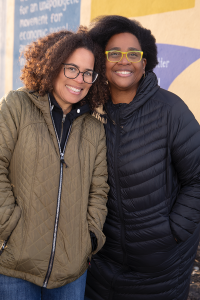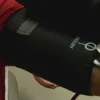In February, Dr. Catherine Squires wrote an essay for womenspress.com titled “Stress Among Black Women in Academia.” Within two weeks it had become the most popular article on the website, surpassing even our home page in readership.
Since our Changemakers Alliance wing takes content into conversation, we have arranged to co-host a noon forum at First Unitarian Society of Minneapolis on Sunday, June 2. Dr. Squires, author Dr. Taiyon J. Coleman, and Center for Antiracism Research for Health Equity Director Dr. Rachel Hardeman will speak together about racial weathering and other concepts related to public health. The event will be co-sponsored by African American Leadership Forum and University of Minnesota Press.
Writer Alexis Yeboah talked with Squires and Coleman about some of the concepts that will be part of that conversation.

Dr. Catherine Squires (l) and Dr. Taiyon Coleman
Dr. Squires, you wrote a column for Minnesota Women’s Press to raise awareness of the ways Black women face institutional roadblocks, including in academic positions. Dr. Coleman, you have written a book about your experiences as a highly educated Black woman in America. Why have you felt compelled to bring your perspectives around Black women’s health to the forefront?
Catherine Squires: When I was an assistant professor, I told doctors I thought I might have a thyroid condition and they said to try antidepressants. It wasn’t until I had unsuccessfully tried to get pregnant for a while that I was allowed to have testing. The first thing they did was a thyroid exam. I got a call from the nurse later that day saying my thyroid hormone was off the charts too low. “No wonder you can’t get pregnant,” she said.
Those experiences started to pile up faster and faster. Systems, such as health care and my higher ed employer, were dismissive when I asked about some basic things. I had to investigate for myself. There were many times where I felt overwhelmed and unheard.
People talk about the second shift: you go to work, you bring home the bacon, and then you have to fry it up in the pan and take care of the kids, elderly parents, or others in the community.
There is a third shift for women of color: advocating for yourself in other systems. We are perceived as not understanding ourselves, or needing to be told what to do.
A lot of the contributions of Black feminists [are about pointing out] the ways that Black women’s bodies have been portrayed as objects to be controlled, particularly in reproduction. That we are unruly and need to be managed. I learned [these things] intellectually and I experienced them in the doctor’s office.
I think that’s why our communities have always tried to keep our home remedies and our root medicine, because [good] care and access have always been issues.
Excerpt from “Stress Among Black Women in Academia,” by Dr. Catherine Squires, womenspress.com (February 2024)
“By the time I left, I had experienced a miscarriage, time in the cardiac ward, panic attacks, insomnia, depression, and more. I cringed at the attacks on Harvard’s Claudine Gay and sobbed at the heartbreaking suicide of Antoinette Candia-Bailey [in Missouri]. Three of my Black women friends have shared diagnoses of cancer, heart failure, and more that erupted as they tried to make progress at their institutions.”
Taiyon J. Coleman: I’ve always been a strong Black girl. That’s how I was born and that’s what was mirrored and modeled for me — I was a proud Black woman descendant of American slaves.
As the first person in my family to graduate from college, my trajectory was hard, but I didn’t think about how racism impacted things while I was going through all the hard shit to achieve my goals. In my mind, it was simply “let me get through it.”
When I was younger, I lost my baby at 18 weeks. I had a doctor who, when I told me it was my fibroids. But in fact, I was going into labor. Struggling with high blood pressure, hypertension, obesity — I initially never thought that my health challenges and experiences with health care had a direct connection to something outside my own body. I kept thinking, “let me just keep pushing through, despite my body’s warning bells.”
It was only later in life, when my physical health couldn’t be ignored, that my past behavior of pushing through began to change. Today, I am learning to live in a different way. It’s hard to unlearn and to relearn.
I have an advanced degree. I have a tenure track job. I live in south Minneapolis. My mom was single mother to five children and literally sacrificed her life for what I have achieved. Yet I still had to struggle with structural racism to buy a house. My kids still deal with implicit bias in their education. I have learned the hard way that my education doesn’t protect me from racism and sexism.
I don’t necessarily have any answers, but I think the most important thing I can do is show people that we aren’t alone.
Let’s talk more about how racial weathering — facing continuous exposure to race-based stressors that lead to faster aging — is applicable to Black people within academics.
CS: Shout out to Dr. Rachel Hardeman, because her Center for Antiracism Research for Health Equity has [started to amplify the public health impacts of] “racial weathering.”
An example: I had a student leave me an anonymous note after I lectured about The Birth of a Nation, which was the first blockbuster film and also a racist piece of propaganda for the Ku Klux Klan. The student wrote, “This is supposed to be a survey of media studies, not Black media studies.”
All of this is energy expenditure. It takes your energy and raises your blood pressure. Women of color who are educated are more likely to have a higher rate of infant mortality than a white woman without a high school education. There’s little health benefit for us as we go up the ladder in income and education.
TC: You can’t have that weathering by individuals within an institution unless they’re responding to a climate that already exists — an institution through its silence or actions that says this is okay, that you are vulnerable, that you are not important and that I can pick on you. If we walk away from those university-tenured jobs, what are the options for us?
CS: I love Sara Ahmed’s work on this, about how diversity, equity, and inclusion (DEI) workers are seen as killjoys. An institution feels like it is doing great. They are getting grants. They’re graduating students. They’re winning basketball games. The DEI worker says, “We have to include more people from these different groups and change up the curriculum.”
DEI leaders are seen as causing trouble, because they’re actually asking people to change how they operate and how they see the world. That is uncomfortable.
Excerpt from Traveling Without Moving: Essays from a Black Woman Trying to Survive in America by Dr. Taiyon Coleman, University of Minnesota Press, June 2024
“What I found and experienced instead within the university’s walls was canonized book lists … that failed to include any writers of color; being told by some faculty that any … writing about race, ethnicity, and sexual orientation as subject and theme was ‘pat’ and that race had already been done before. … However, the university willingly used my body’s photographic images in its publications to demonstrate the welcoming environment and equity of its university and program.”
What are some things on a societal level that can be done to address the gaps of physical and mental burnout?
CS: I’m a very big fan of folks like adrienne maree brown and her Emergent Strategy book. How do you get people to trust each other, work with each other, imagine together, and start experimenting on using care instead of competition as the foundation?
I did my higher-level teacher training for yoga. In my training program, I was the only Black person in a cohort. They showed a film that was problematic about decolonization. I wrote them a note that explained the context. I sent them links to things that had been written when the film came out.
They took it out of the curriculum. They shared with the cohort why they took it out. They invited me into a longer conversation. Our relationship is changing.
TC: It’s about learning that the room is crooked like [political commentator] Melissa Harris-Perry says. Understanding it, us talking to each other, telling our stories, and being a community. Not to think that we have failed, or there’s something wrong with us because we didn’t survive this structure — sometimes we’re socialized just to put up with it. “Look how much you’re getting paid. Look at the prestige.”
Sometimes it’s about touching each other and saying, “It’s okay, you do get hurt, and that does hurt. We do care. We can talk about it. We form a community around it and move forward.” How do we reach out to each other to make these things happen?
CS: Self-care is community care. We’ve never done it alone.




